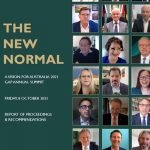The great ‘leadership debt’ affecting Australian business

Too many of our leaders are avoiding confrontation and direct communication with staff, causing a massive leadership vacuum in corporate Australia.
Professional corporate coach Travis Thomas from Team Buffalo says this ‘leadership debt’ is restricting Australian business and hampering the next generation of leaders.
“There is a giant leadership vacuum across middle-tier businesses,” said Mr Thomas.
“The biggest issue is failing to address problems in business early, and avoiding direct and difficult conversations,” he said.
“Whenever the conflict or conversation is avoided it creates a leadership debt, and the issue is rife in Australia.”
“Every decision you make and every failed interaction or non-interaction with an employee accumulates a debt and companies will inherit that debt.”
“You will either pay for it up front or it will cost you later. It’s a bit like a credit card. You can pay the minimum payments but you’re going to owe a lot of money at some point.”
“Leaders need to be invested in their people to even start getting the results they’re after.”
Mr Thomas says poor leadership will ultimately lead to low employee morale. It not only slows productivity but also increases the companies rate of staff turnover and ultimately comes at a cost to the business.
“In a time of record low unemployment, it has never been easier for disengaged employees to leave workplaces where things never change.”
“When a person in a leadership position doesn’t have the right qualities to lead, can’t communicate effectively and has no emotional intelligence (competence), their behaviour will erode the company culture and effect the bottom line of the business.”
“Without a goal-oriented leader with a vision, staff don’t have direction, teamwork suffers and performance lags.”
Six qualities that demonstrate strong leadership in business include:
- Consistent communication: What separates the good leaders from the weaker ones is steady, regular communications. Ad-hoc dialogues and mixed messages makes staff uneasy and creates an uncertain environment. While it’s the most important skill for leaders to have, it’s also by far the most common weakness.
- Spot fires are better than bushfires: Taking care of a small problem now prevents leadership debt growing out of control. But too many leaders in Australia avoid confrontation or hope issues will go away. Having the courage to air, tackle and resolve your concerns is of huge benefit to leaders and the people they work with.
- Avoid sugar coating, jargon and corporate-speak: Have the difficult conversation and don’t use euphemisms, jargon or corporate speak to soften the blow if you have difficult news to convey. More often than not, it leads to the message you’re trying to communicate being lost altogether.
- Have empathy: The amount of goodwill you can generate simply by looking at issues from their point of view is extraordinary. Leaders in the post pandemic work environment need to consider how their team’s needs may have changed, particularly over the last two years. As work and personal lives have merged, there’s a new dialogue of childcare, school pick-ups and marital issues taking place in the hybrid office and leaders need to embrace this reality.
- Prioritise flexibility: Employees expectations and priorities have changed and office-based perks won’t cut it in the post-pandemic world. Talk to your employees and ask them how you can support them. Rolling out incentive schemes like flexible working arrangements, better resources for remote working and career progression plans will improve morale and do more to retain a skilled workforce than a salary increase.
- Think differently and articulate your vision:The pandemic has shown people want a different style of leadership and leaders with a vision. Managers were forced to make quick decisions and the speed in which some moved their workforce made those leaders appear more accessible, humane and empathetic. It’s a template employees now expect, to work in high trust organisations and if leaders can’t deliver it, they will lose their workforce.
Mr Thomas says leading in the new world requires new competencies and delivering on trust so there is certainty in what has become an uncertain world.
“There has to be a clear vision and a consistency of purpose, behaviour, judgements and engagements.”
HAVE YOUR SAY:
How does your business foster positive leadership?
Post a comment on First 5000 – Have your Say on LinkedIn today or email editor@first5000.com.au with your story.








